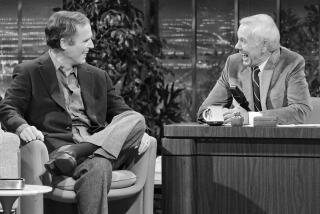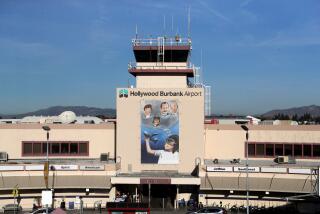A slice of Burbank above the flatland bustle
For viewers of “The Wonder Years,” Burbank’s hillside district may look familiar. University Avenue and nearby John Muir Middle School were chosen to portray suburbia in the ABC television take on growing up in the ‘60s. And no wonder. The hillside district, rising on Burbank’s north side, is above the bustle of the flatlands and somewhat removed in time.
*
For the record:
12:00 a.m. June 19, 2003 For The Record
Los Angeles Times Thursday June 19, 2003 Home Edition Main News Part A Page 2 National Desk 1 inches; 36 words Type of Material: Correction
Burbank hills -- A map in Sunday’s Real Estate section with an article on the Burbank hillside district incorrectly located the neighborhood to the west of the Golden State Freeway. It is east of the freeway.
For The Record
Los Angeles Times Sunday June 22, 2003 Home Edition Real Estate Part K Page 3 Features Desk 1 inches; 38 words Type of Material: Correction
Burbank hills -- A map in the June 15 Real Estate section accompanying a story on the Burbank hillside district incorrectly located the neighborhood to the west of the Golden State Freeway. It is east of the freeway.
Strictly residential
There are no businesses above the busy Glenoaks Boulevard strip. Block parties spring up every Fourth of July, when a fireworks show in the hills dazzles revelers. A city-run, 18-hole golf course is perched high in the hills. Summer concerts at the Starlight Bowl create the district’s only traffic congestion.
But minutes away, the Burbank Village area is a beehive of retail and entertainment options, including an IKEA, numerous restaurants, 28 movie screens and a shopping mall.
*
Film lots, hangars
The twin engines behind the growth of Burbank were the former Lockheed Corp. and the entertainment industry. After its aircraft helped win wars hot and Cold, Lockheed left town. Many of its retirees still tend their yards in the hillside district. Nearby Burbank Airport is another Lockheed spinoff.
But the studios -- Warner Bros., Disney, NBC -- and numerous pre- and post-production facilities continue to make Burbank the backyard of the film and TV industry.
*
Mansions, tract homes
Houses include mansion-like palaces high in the Verdugo Hills to fanciful Disney-esque castles on suburban lots.
But the soul of the hillside district is arguably the Benmar tract, which was built as starter homes in the early 1950s and was one of the first big housing tracts in Burbank, according to Mike McDonald, a real estate broker with Re/Max Elite. Benmars “are without a doubt the most popular of the hillside homes,” said broker David Fogg of Re/Max Town Center Realty.
The mostly three-bedroom Benmar homes are characterized by “raised foundations and hardwood floors ... construction quality was very good,” said Susan Bowers, executive director of the Burbank Chamber of Commerce. “Today, no two look alike. Everyone has modified those homes and beautified them, and they’re all entirely different.”
*
Report card
Schools are a magnet for new homeowners. Served by the Burbank Unified School District, hillside area schools include Burbank High, which had a score of 664 out of 1,000 on the 2002 California Academic Performance Index. Other schools include John Muir Middle, which scored 755; and Jefferson Elementary, which scored 810.
*
Historical values
Single-family detached resales for the 91504 ZIP Code, which includes the hillside district:
Year...Median Price
1990...$296,250
1995...$225,000
2000...$325,309
2002...$403,091
2003*...$416,000
*year to date
*
Stock report
In early June there were 37 detached homes on the market in the hillside district, with asking prices ranging from $439,000 to $1.9 million, McDonald said. “For the dirt alone,” he said, a 7,500-square-foot lot on the hills in Burbank ranges from $375,000 to $400,000.
*
Sources: www.ci.burbank.ca.us; DataQuick Information Services; www.us.imdb.com; www.burbankairport.com; “A History of Burbank,” by Mary Jane Strickland and Theodore X. Garcia, Burbank Historical Society, 2000.
More to Read
Inside the business of entertainment
The Wide Shot brings you news, analysis and insights on everything from streaming wars to production — and what it all means for the future.
You may occasionally receive promotional content from the Los Angeles Times.










